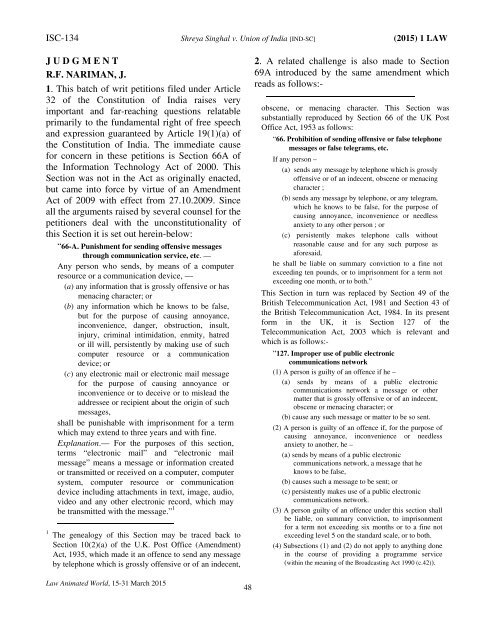Editor: I. Mallikarjuna Sharma Volume 11: 15-31 March 2015 No. 5-6
Martyrs memorial special issue of 15-31 March 2015 paying tributes to Bhagat Singh and other comrades.
Martyrs memorial special issue of 15-31 March 2015 paying tributes to Bhagat Singh and other comrades.
Create successful ePaper yourself
Turn your PDF publications into a flip-book with our unique Google optimized e-Paper software.
ISC-134 Shreya Singhal v. Union of India [IND-SC] (20<strong>15</strong>) 1 LAW<br />
J U D G M E N T<br />
R.F. NARIMAN, J.<br />
1. This batch of writ petitions filed under Article<br />
32 of the Constitution of India raises very<br />
important and far-reaching questions relatable<br />
primarily to the fundamental right of free speech<br />
and expression guaranteed by Article 19(1)(a) of<br />
the Constitution of India. The immediate cause<br />
for concern in these petitions is Section 66A of<br />
the Information Technology Act of 2000. This<br />
Section was not in the Act as originally enacted,<br />
but came into force by virtue of an Amendment<br />
Act of 2009 with effect from 27.10.2009. Since<br />
all the arguments raised by several counsel for the<br />
petitioners deal with the unconstitutionality of<br />
this Section it is set out herein-below:<br />
“66-A. Punishment for sending offensive messages<br />
through communication service, etc. —<br />
Any person who sends, by means of a computer<br />
resource or a communication device, —<br />
(a) any information that is grossly offensive or has<br />
menacing character; or<br />
(b) any information which he knows to be false,<br />
but for the purpose of causing annoyance,<br />
inconvenience, danger, obstruction, insult,<br />
injury, criminal intimidation, enmity, hatred<br />
or ill will, persistently by making use of such<br />
computer resource or a communication<br />
device; or<br />
(c) any electronic mail or electronic mail message<br />
for the purpose of causing annoyance or<br />
inconvenience or to deceive or to mislead the<br />
addressee or recipient about the origin of such<br />
messages,<br />
shall be punishable with imprisonment for a term<br />
which may extend to three years and with fine.<br />
Explanation.— For the purposes of this section,<br />
terms “electronic mail” and “electronic mail<br />
message” means a message or information created<br />
or transmitted or received on a computer, computer<br />
system, computer resource or communication<br />
device including attachments in text, image, audio,<br />
video and any other electronic record, which may<br />
be transmitted with the message.” 1<br />
1 The genealogy of this Section may be traced back to<br />
Section 10(2)(a) of the U.K. Post Office (Amendment)<br />
Act, 1935, which made it an offence to send any message<br />
by telephone which is grossly offensive or of an indecent,<br />
2. A related challenge is also made to Section<br />
69A introduced by the same amendment which<br />
reads as follows:-<br />
obscene, or menacing character. This Section was<br />
substantially reproduced by Section 66 of the UK Post<br />
Office Act, 1953 as follows:<br />
“66. Prohibition of sending offensive or false telephone<br />
messages or false telegrams, etc.<br />
If any person –<br />
(a) sends any message by telephone which is grossly<br />
offensive or of an indecent, obscene or menacing<br />
character ;<br />
(b) sends any message by telephone, or any telegram,<br />
which he knows to be false, for the purpose of<br />
causing annoyance, inconvenience or needless<br />
anxiety to any other person ; or<br />
(c) persistently makes telephone calls without<br />
reasonable cause and for any such purpose as<br />
aforesaid,<br />
he shall be liable on summary conviction to a fine not<br />
exceeding ten pounds, or to imprisonment for a term not<br />
exceeding one month, or to both.”<br />
This Section in turn was replaced by Section 49 of the<br />
British Telecommunication Act, 1981 and Section 43 of<br />
the British Telecommunication Act, 1984. In its present<br />
form in the UK, it is Section 127 of the<br />
Telecommunication Act, 2003 which is relevant and<br />
which is as follows:-<br />
“127. Improper use of public electronic<br />
communications network<br />
(1) A person is guilty of an offence if he –<br />
(a) sends by means of a public electronic<br />
communications network a message or other<br />
matter that is grossly offensive or of an indecent,<br />
obscene or menacing character; or<br />
(b) cause any such message or matter to be so sent.<br />
(2) A person is guilty of an offence if, for the purpose of<br />
causing annoyance, inconvenience or needless<br />
anxiety to another, he –<br />
(a) sends by means of a public electronic<br />
communications network, a message that he<br />
knows to be false,<br />
(b) causes such a message to be sent; or<br />
(c) persistently makes use of a public electronic<br />
communications network.<br />
(3) A person guilty of an offence under this section shall<br />
be liable, on summary conviction, to imprisonment<br />
for a term not exceeding six months or to a fine not<br />
exceeding level 5 on the standard scale, or to both.<br />
(4) Subsections (1) and (2) do not apply to anything done<br />
in the course of providing a programme service<br />
(within the meaning of the Broadcasting Act 1990 (c.42)).<br />
Law Animated World, <strong>15</strong>-<strong>31</strong> <strong>March</strong> 20<strong>15</strong><br />
48



